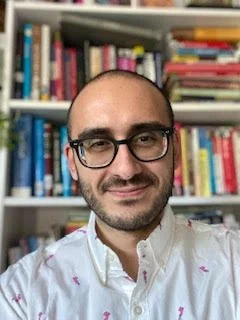Mehmet Alpaslan
Turkish Team
“A world with language justice is a world in which the language that a person speaks does not in any way influence their access to the rights and privileges that the majority in power benefits from.”
Meet Mehmet Alpaslan, a translator on the Respond Turkish Team. Mehment also translates Spanish.
Mehmet is originally from Turkey, but had the good fortune of growing up across many different countries in Europe and Latin America. He landed in the United States after obtaining his PhD in astrophysics, and moved to New York after some years in California. He has a doctorate in astrophysics, and first moved to the USA to work at NASA for 3 years. Mehmet now works in clinical research, and when he is not spending his free time socializing with friends and loved ones, he likes to complain about running (while also running a lot).
Mehmet shares what he calls a “nifty” thing about Turkish. “It is a completely phonetic language! That means that there is no mystery to how anything is pronounced – words are pronounced just as they are read. The language also has some really beautiful rules regarding vowel harmony, which can seem odd to non-native speakers, but instills a deep sense of what words sound ‘normal’ in Turkish.”
His favorite word in Turkish is, ‘x-ray’ is ‘röntgen’ – which he tells us is the transliteration of the name of the physician that first discovered them: Wilhelm Röntgen!
Mehmet appreciates the amount of institutional support he receive as a member of the Respond team, and says it is simply incredible, “From having access to trauma-informed interviewing guides to trained counselors, I always feel like I have the weight of a whole organization behind me when I volunteer.”
As an immigrant himself, Mehmet feels a deep sense of kinship with the people he translates for when volunteering with Respond. While having this shared background makes some of the translation work easier, it also makes it very difficult to not take on some of the burden of that trauma. He says he is privileged enough to have access to a wonderful therapist–and that being a “painfully obnoxious extrovert”, he regains a lot of his mental health by surrounding himself with friends and loved ones.
Mehmet thinks it is important to say that his experiences do not reflect those of the average person navigating through the United State’s deeply flawed and racist immigration system, and that he’s fortunate enough to be born to a family that could afford to give him the education that helped him move to the U.S. with relative ease.
In doing this work, he shares that he’s come to understand just how unfair and arbitrary this privilege is. “It is tempting to experience guilt over this (a form of survivor’s guilt, perhaps), but the work I do as a translator helps me channel those feelings into actively being able to help my fellow immigrants.”
To Mehmet, a world with language justice is a world in which the language that a person speaks does not in any way influence their access to the rights and privileges that the majority in power benefits from. This could be something as simple as asylum application forms being translated into multiple languages, to an ethnic minority having the ability to educate and express themselves in their own language (this is particularly close to home to him, as I am half-Kurdish).

